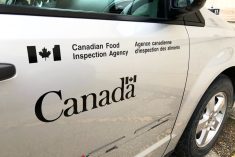Canadian governments will need to come up with incentives for farmers going organic if they want domestic supply to keep up with domestic demand, a national organic sector group warns.
The Canada Organic Trade Association on Wednesday released data showing 5,053 certified organic operations in Canada, accounting for 2.43 million acres of land, at the end of 2015 — a 1.5 per cent increase in acres from 2014.
Over half of Canada’s organic operations are in Quebec, Saskatchewan and Ontario, COTA said, with 63.8 per cent of organic acres in pasture, down slightly from 65 per cent on “significant increases” in vegetable and root crop acres, and in fruit and nut acres.
Read Also

Pea, lentil outlooks have some positive signals – Penner
As pulse growers consider what to plant this spring, Chuck Penner of Leftfield Commodities Research said there is some optimism in the Canadian pulse market. Penner gave a presentation at the Saskatchewan Pulse Growers meeting in Swift Current on Feb. 4.
Of Canada’s certified operations in 2015, 4,045 are considered “primary producers” with another 294 now in transition, plus 618 organic livestock operations and 1,542 organic processors, manufacturers and retailers. (Organic “operations” may fall into more than one of those categories, COTA noted.)
Canada, however, also imported at least $652 million worth of organic products in 2015, a total COTA said is up 37 per cent from 2012.
Furthermore, organic retail sales in Canada are now worth $4.7 billion annually, representing a 13.6 per cent increase per year since 2007, COTA said.
“Our organic agricultural production in Canada cannot keep up with the exponential growth of the demand, this is resulting in an increased reliance on import organics,” COTA’s Ottawa-based executive director Tia Loftsgard said in a release.
“Our government must introduce incentives to encourage farm operators to transition to certified organic agriculture,” Loftsgard said, noting both the European Union and U.S. already have programs and policies that “incentivize” farmers to transition to organic.
Those programs fit into “Green Box” criteria at the World Trade Organization and thus would be allowable subsidies under the WTO’s Agriculture Agreement, COTA said.
The Canadian Organic Standards call for farmland to be managed according to organic practices for a three-year transition period before a harvested crop can be marketed as “organic.”
Some provincial governments have previously offered supports to organic producers during the transition period. Quebec, for one, recently extended its organic agriculture conversion support program to the end of March 2022.
The latest numbers from COTA, Loftsgard said, also show the organic sector “continues to rely on the voluntary disclosure of data by certifiers and provincial organizations. In 2016 we finally have universal participation, resulting in the most rigorous production data yet.”
That said, “year-over-year change and inconsistencies remain a risk until a national mandatory data system has been implemented.” — AGCanada.com Network















